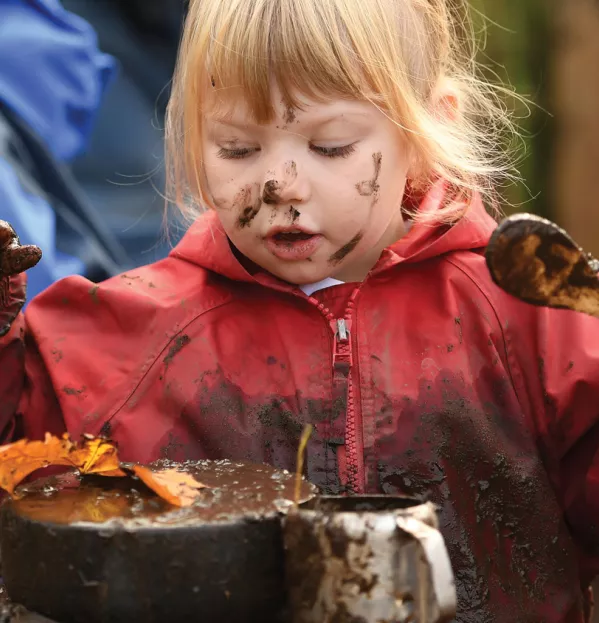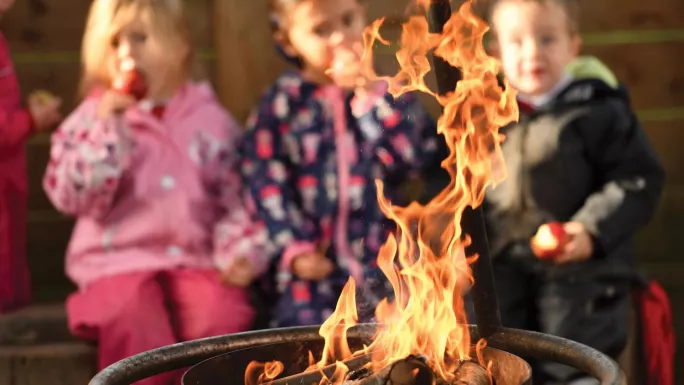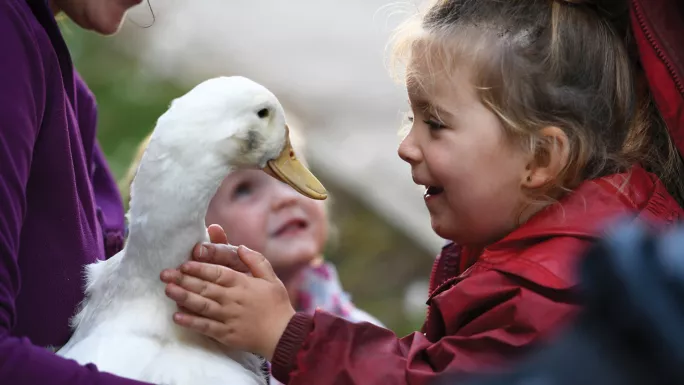Making a school with empty classrooms ‘outstanding’

Walk into Boldon Nursery School in the middle of the day and, for a moment, you might wonder where everyone has gone.
For most of the school day, the building is almost completely empty. That’s because the winner of overall school of the year at the TES Schools Awards 2016 conducts almost all of its teaching outside.
“We have the most expensive changing space ever,” jokes headteacher Sue Stokoe as the children put on waterproofs and wellies after their morning break.
Outside, the children freely explore the garden behind the school building in Boldon Colliery, a former mining town near Sunderland. The space is divided into an artificial beach complete with a replica of South Shields’ Souter Lighthouse, an allotment, a shelter with a fire, a tunnel made of willow branches and trees for climbing in a wilder part of the garden. The school’s pet duck, Elizabeth, wanders the grounds.

The importance of mucky play
There’s also a “mud kitchen” - the school’s messier, outdoor alternative to that essential feature of nursery schools, home corner, where children play at families.
Even if they take a bit of encouragement when they first arrive, children are out here in all weathers. Would anything keep them inside? “Gale-force winds,” says Mrs Stokoe. “If it gets to a point where it will actually lift a child off the ground, we have to come in.”
With traditional classrooms barely used, and children having the freedom to run around, climb things, splash water around and get muddy, some observers have wondered how the children learn anything and meet their targets. “Lots of [other] schools think we’re just mucking around,” the headteacher says.
An outstanding approach
Staff were nervous before the school’s first Ofsted inspection after beginning its transformation from a traditional nursery 10 years ago. When the day of the visit came, there was torrential rain and the inspector was in a suit and high heels.
But after seeing the students in action, Ofsted gave them a grade of “good”, up from “satisfactory”. In its most recent inspections, it has been graded “outstanding” twice, with inspectors praising the rapid progress with children who typically have low skills for their age. Support for pupils with special needs and the most able children were regarded as particularly effective.
Far from just mucking around, the children’s interests and explorations are encouraged in a way that is intended to meet all the requirements of the Early Years Foundation Stage and prepare them for Reception classes at primary school.
‘Lots of other schools think that we’re just mucking around’
“People ask, where’s the learning? Where’s the maths, where’s the literacy?” says teacher Sam Kerr. She gives the example of learning to hold a pen, one of the essentials before beginning at primary school.
At Boldon, they make their own pencils: they peel willow sticks, help to light a fire, char the sticks and use them to make marks. It’s a learning experience in itself about the properties of wood and charcoal, but it also involves building dexterity and strength, which is essential for developing the correct grip.
Their writing is likely to be about things that interest them in their explorations: one child was wandering the garden taking notes on a clipboard. Where they’re not working on paper, the school captures important moments of learning with cameras as they happen.
Staff say that the impact of being active all day on the children’s physical development is striking. “When they start here, all the parents are pushing their buggies. After a few weeks, the buggies go and the children are walking, because they are developing their stamina,” Mrs Stokoe says.

Teaching good judgement
If childhood today isn’t always like the Swallows and Amazons vision that Boldon Nursery sometimes resembles, health and safety usually gets the blame. Right on cue as the topic is raised, Mrs Stokoe leaps into action as one child takes a swig from a tub of dirty water that pupils have been playing with.
The school’s approach is to identify hazards but to tolerate minor risks in order to develop children’s own awareness. “You’ve got to invest the time in teaching the children how to be safe and how to judge risks for themselves,” she says.
Holding a pen is an essential skill before primary school. At Boldon they make their own
Just as the children learn by experiment, so did the school, developing its approach over the years. Ms Kerr says she tells staff from the schools who visit that they need to do the same. “You can’t look for a perfect answer that you can copy and paste. It has to work for you,” she says.
But the school entertains dozens of visits to try to communicate its ethos as an alternative to high-pressure, regimented school systems. “My childhood was all about exploring, and nobody ever told me it was wrong,” says Ms Stokoe. “I’m even more passionate about childhood now, because I don’t see children having that. And we’re in an education system that doesn’t support it.”
You need a Tes subscription to read this article
Subscribe now to read this article and get other subscriber-only content:
- Unlimited access to all Tes magazine content
- Exclusive subscriber-only stories
- Award-winning email newsletters
Already a subscriber? Log in
You need a subscription to read this article
Subscribe now to read this article and get other subscriber-only content, including:
- Unlimited access to all Tes magazine content
- Exclusive subscriber-only stories
- Award-winning email newsletters